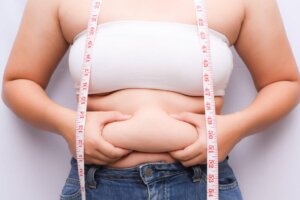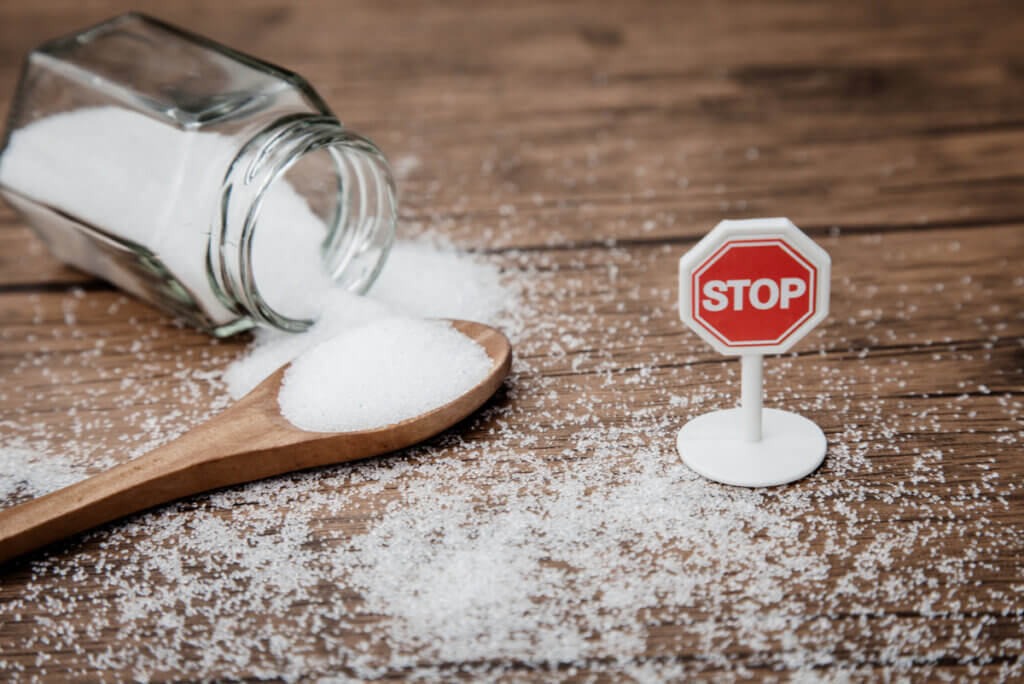7 Foods to Avoid if You Want to Lose Weight

If you want to lose weight and you’re consuming any of the 7 foods we’ll talk about in the following article, you may be wasting your time and lacking results. Many believe that physical activity alone can help us with weight loss. But, although exercise is vital to achieving an ideal and healthy physical state, food is a priority. In fact, an unhealthy or insufficient diet can trigger problems or injuries.
In addition to reviewing those foods that you should avoid if you want to lose weight, we’ll also describe those that, although they’re not as harmful, aren’t favorable and that, depending on your commitment, it’s better to leave them aside or eat them only in moderation.
7 foods to avoid if you want to lose weight
It’s important to note that you should eliminate these foods from your diet not only if you want to lose weight, but also because some of them can lead to diseases such as diabetes, liver disease, and heart problems. So, more than a guide to reaching an ideal weight, we want you to keep in mind how what you consume influences your body.
1. Sugar and its derivatives
Sugar is the most widely used natural product in the world when it comes to sweetening foods and beverages. It’s mostly extracted from sugar cane and also from sugar beets. It’s a monosaccharide or disaccharide that can be harmful to health if consumed in excess.
Its uncontrolled consumption not only prevents you from losing weight, but it can also cause an increase in triglyceride levels and lead to excess weight or obesity. This occurs when the energy provided by glucose exceeds energy expenditure.
What does this mean? It means that when we eat more sugar than we can burn with our physical activity, we’re overloading. This is why the World Health Organization states that the consumption of sugar shouldn’t exceed 5% of the total calories consumed in a day.
At the same time, it’s crucial to pay attention to blood sugar levels, as their increase is responsible for diabetes mellitus, a disease that has a high prevalence and causes high mortality in the world.
So, it’s important to moderate sugar consumption or stop consuming it altogether, replacing it with sweeteners such as stevia. Avoiding sugary drinks such as sodas, industrial juices, packaged sweets, and their derivatives will promote weight loss.

2. Refined flours
Refined flours are those that come from natural sources such as wheat, but that have gone through an industrial process to make them finer. In this process, the flours lose a good part of their nutrients and components. They’re even mixed with sugar.
This refined flour is used in pastry shops because it facilitates the preparation of different products. You should avoid its consumption, as it has a low concentration of fiber and, therefore, it takes time to digest and provide a feeling of fullness.
In the same way, you should be careful with the consumption of foods made with this type of flour because they tend to have a lot of calories. They’re characterized by being small products, but the caloric intake is higher.
Therefore, it’s best that you avoid consuming white bread, donuts, pizza, cakes or pastry products, and pasta. Opt for those foods that are made with whole wheat flour.
3. Fats and fried foods
Obesity is a disease that is becoming more and more worrisome. Those who suffer from it are prone to cardiovascular disease and diabetes. Studies have shown that a sedentary lifestyle and high consumption of foods rich in fat are the main triggers.
Fats are a source of energy that the body reserves for when there are demands or long-term efforts. Some foods provide us with saturated fatty acids, which carry vitamins and have certain physiological, immune, and structural functions. Others have a higher concentration of trans fatty acids.
Excessive consumption is responsible, among other things, for the appearance of coronary diseases. Therefore, to take care of your health and lose weight, avoid fried foods such as potatoes, tortilla chips, empanadas, hamburgers, bacon, and fried chicken, among others.
4. Processed meats or sausages
Hot dogs, chorizos, salami, black pudding, ham, and bacon are some of the most well-known sausages. They’re the cause of the appearance of cardiovascular diseases and cause countless premature deaths. This was confirmed by the specialized magazine BMC Medicine.
The World Health Organization explains that meat is classified as group 1, considering that there’s sufficient evidence of its action in promoting malignant cell changes in humans.
In addition to these implications, it’s important to avoid eating these foods because, as they’re made from different types of meat, such as pork, they can influence weight gain. The reason is that they have a high concentration of saturated fats that end up sticking to the walls of blood vessels.
5. Commercial dressings or sauces
Among the foods that you should avoid if you want to lose weight, we find sauces and dressings. Although their consumption is occasional, they’re made of fats, sugars, salt, and additives, some of natural origin and others synthetic.
These sauces don’t contribute to your goal of reaching a healthy weight because they’re considered to be of low nutritional quality. So, if you want to give some food an extra flavor, it’s best to prepare your own tomato or avocado paste.
6. Alcoholic beverages
Alcohol is one of the foods with the highest energy density. What’s more, it increases appetite and doesn’t provide a feeling of fullness, which leads consumers to increase their food intake. Finally, its energy contribution is nutritionally poor.
In summary, it’s crucial to stay away from alcoholic drinks, as they stimulate the intake of other foods. It’s common that, in order to satisfy the hunger that they produce in people, they opt for robust, fried, and flour-laden foods. This doesn’t help at all if you want to lose weight.

7. Dairy
Milk is a source of saturated fat that turns out to be very healthy for people. However, when you want to lose weight, it’s better to refrain from consuming certain dairy products. It’s best to consume skimmed milk, which provides essential nutrients such as calcium, without adding fat.
You should also stay away from dairy shakes and ice creams that are high in sugar. Opt for those with a good concentration of protein, such as Greek yogurt, which favors the feeling of satiety and helps with weight loss without reducing lean mass.
Losing weight is a multifactorial task
Now that you know the main foods that you should avoid if you want to lose weight, you should also know that it’s not enough to stop consuming them in order to improve your figure. Exercise is the best ally of a healthy life and a healthy self-perception.
In the same way, certain changes in habits contribute to the final goal. Improving rest times, reducing sedentarism, and limiting alcoholic beverages are fundamental aids.
If you want to lose weight and you’re consuming any of the 7 foods we’ll talk about in the following article, you may be wasting your time and lacking results. Many believe that physical activity alone can help us with weight loss. But, although exercise is vital to achieving an ideal and healthy physical state, food is a priority. In fact, an unhealthy or insufficient diet can trigger problems or injuries.
In addition to reviewing those foods that you should avoid if you want to lose weight, we’ll also describe those that, although they’re not as harmful, aren’t favorable and that, depending on your commitment, it’s better to leave them aside or eat them only in moderation.
7 foods to avoid if you want to lose weight
It’s important to note that you should eliminate these foods from your diet not only if you want to lose weight, but also because some of them can lead to diseases such as diabetes, liver disease, and heart problems. So, more than a guide to reaching an ideal weight, we want you to keep in mind how what you consume influences your body.
1. Sugar and its derivatives
Sugar is the most widely used natural product in the world when it comes to sweetening foods and beverages. It’s mostly extracted from sugar cane and also from sugar beets. It’s a monosaccharide or disaccharide that can be harmful to health if consumed in excess.
Its uncontrolled consumption not only prevents you from losing weight, but it can also cause an increase in triglyceride levels and lead to excess weight or obesity. This occurs when the energy provided by glucose exceeds energy expenditure.
What does this mean? It means that when we eat more sugar than we can burn with our physical activity, we’re overloading. This is why the World Health Organization states that the consumption of sugar shouldn’t exceed 5% of the total calories consumed in a day.
At the same time, it’s crucial to pay attention to blood sugar levels, as their increase is responsible for diabetes mellitus, a disease that has a high prevalence and causes high mortality in the world.
So, it’s important to moderate sugar consumption or stop consuming it altogether, replacing it with sweeteners such as stevia. Avoiding sugary drinks such as sodas, industrial juices, packaged sweets, and their derivatives will promote weight loss.

2. Refined flours
Refined flours are those that come from natural sources such as wheat, but that have gone through an industrial process to make them finer. In this process, the flours lose a good part of their nutrients and components. They’re even mixed with sugar.
This refined flour is used in pastry shops because it facilitates the preparation of different products. You should avoid its consumption, as it has a low concentration of fiber and, therefore, it takes time to digest and provide a feeling of fullness.
In the same way, you should be careful with the consumption of foods made with this type of flour because they tend to have a lot of calories. They’re characterized by being small products, but the caloric intake is higher.
Therefore, it’s best that you avoid consuming white bread, donuts, pizza, cakes or pastry products, and pasta. Opt for those foods that are made with whole wheat flour.
3. Fats and fried foods
Obesity is a disease that is becoming more and more worrisome. Those who suffer from it are prone to cardiovascular disease and diabetes. Studies have shown that a sedentary lifestyle and high consumption of foods rich in fat are the main triggers.
Fats are a source of energy that the body reserves for when there are demands or long-term efforts. Some foods provide us with saturated fatty acids, which carry vitamins and have certain physiological, immune, and structural functions. Others have a higher concentration of trans fatty acids.
Excessive consumption is responsible, among other things, for the appearance of coronary diseases. Therefore, to take care of your health and lose weight, avoid fried foods such as potatoes, tortilla chips, empanadas, hamburgers, bacon, and fried chicken, among others.
4. Processed meats or sausages
Hot dogs, chorizos, salami, black pudding, ham, and bacon are some of the most well-known sausages. They’re the cause of the appearance of cardiovascular diseases and cause countless premature deaths. This was confirmed by the specialized magazine BMC Medicine.
The World Health Organization explains that meat is classified as group 1, considering that there’s sufficient evidence of its action in promoting malignant cell changes in humans.
In addition to these implications, it’s important to avoid eating these foods because, as they’re made from different types of meat, such as pork, they can influence weight gain. The reason is that they have a high concentration of saturated fats that end up sticking to the walls of blood vessels.
5. Commercial dressings or sauces
Among the foods that you should avoid if you want to lose weight, we find sauces and dressings. Although their consumption is occasional, they’re made of fats, sugars, salt, and additives, some of natural origin and others synthetic.
These sauces don’t contribute to your goal of reaching a healthy weight because they’re considered to be of low nutritional quality. So, if you want to give some food an extra flavor, it’s best to prepare your own tomato or avocado paste.
6. Alcoholic beverages
Alcohol is one of the foods with the highest energy density. What’s more, it increases appetite and doesn’t provide a feeling of fullness, which leads consumers to increase their food intake. Finally, its energy contribution is nutritionally poor.
In summary, it’s crucial to stay away from alcoholic drinks, as they stimulate the intake of other foods. It’s common that, in order to satisfy the hunger that they produce in people, they opt for robust, fried, and flour-laden foods. This doesn’t help at all if you want to lose weight.

7. Dairy
Milk is a source of saturated fat that turns out to be very healthy for people. However, when you want to lose weight, it’s better to refrain from consuming certain dairy products. It’s best to consume skimmed milk, which provides essential nutrients such as calcium, without adding fat.
You should also stay away from dairy shakes and ice creams that are high in sugar. Opt for those with a good concentration of protein, such as Greek yogurt, which favors the feeling of satiety and helps with weight loss without reducing lean mass.
Losing weight is a multifactorial task
Now that you know the main foods that you should avoid if you want to lose weight, you should also know that it’s not enough to stop consuming them in order to improve your figure. Exercise is the best ally of a healthy life and a healthy self-perception.
In the same way, certain changes in habits contribute to the final goal. Improving rest times, reducing sedentarism, and limiting alcoholic beverages are fundamental aids.
- Naula López, E. Influencia de la mala alimentación, en las lesiones deportivas de los jugadores de fútbol de segunda categoría en la ciudad de guaranda provincia, bolívar en el campeonato 2012. (2013) Disponible en: http://192.188.46.193/handle/123456789/5572
- El azúcar en la alimentación, evitemos los excesos. Ministerio de Salud y Protección Social de Colombia. Disponible en: https://www.academia.edu/20337893/El_Az%C3%BAcar_en_la_Alimentaci%C3%B3n
- Ingesta de azúcares para adultos y niños. Organización Mundial de la Salud (2015). Disponible en: https://www.who.int/nutrition/publications/guidelines/sugars_intake/es/
- Ángeles Carbajal Azcona. Manual de Nutrición y Dietética. Departamento de Nutrición. Universidad Complutense de Madrid. Disponible en: https://www.ucm.es/data/cont/docs/458-2018-01-10-cap-14-alimentos-2018.pdf
- Sánchez Gavilán, I. Nutrientes y compuestos biactivos del trigo: fibra y polifenoles. Universidad Complutense de Madrid (2016). Disponible en: http://147.96.70.122/Web/TFG/TFG/Memoria/IRENE%20SANCHEZ%20GAVILAN.pdf
- BASTOS, A. A. et al. Obesidad, nutrición y actividad física. Revista Internacional de Medicina y Ciencias de la Actividad Física y el Deporte, v. 5, n. 18, p. 140-153, jun. 2005. Disponible en: https://ri.ufs.br/jspui/handle/riufs/853
- Cabezas-Zábala, C. Hernández-Torres, B. Vargas-Zárate, M. Aceites y grasas: efectos en la salud y regulación mundial. Rev. Fac. Med. 2016 Vol. 64 No. 4: 761-8. Disponible en: http://www.scielo.org.co/pdf/rfmun/v64n4/0120-0011-rfmun-64-04-00761.pdf
- Rohrmann, S., Overvad, K., Bueno-de-Mesquita, H.B. et al. Meat consumption and mortality – results from the European Prospective Investigation into Cancer and Nutrition. BMC Med 11, 63 (2013). https://doi.org/10.1186/1741-7015-11-63
- Marta Malo Mateo. No quiero engordar, pautas para controlar el peso y comer bien. Consejería de Sanidad, Gobierno de Cantabria (2016). Disponible en: http://saludcantabria.es/uploads/pdf/ciudadania/NO_QUIERO_ENGORDAR_v2.pdf
- Villeda Fuentes, C. Elaboración de yogur estilo griego con diferentes porcentajes de ATECAL, leche en polvo y horas de desuerado. Escuela Agrícola Panamericana, Zamorano – Honduras (2015). Disponible en: https://bdigital.zamorano.edu/bitstream/11036/4662/1/AGI-2015-043.pdf
- WHO. (2015). Cancer: Carcinogenicity of the consumption of red meat and processed meat. Consultado el 02 de agosto de 2023. https://www.who.int/news-room/questions-and-answers/item/cancer-carcinogenicity-of-the-consumption-of-red-meat-and-processed-meat
Este texto se ofrece únicamente con propósitos informativos y no reemplaza la consulta con un profesional. Ante dudas, consulta a tu especialista.







